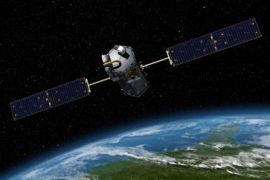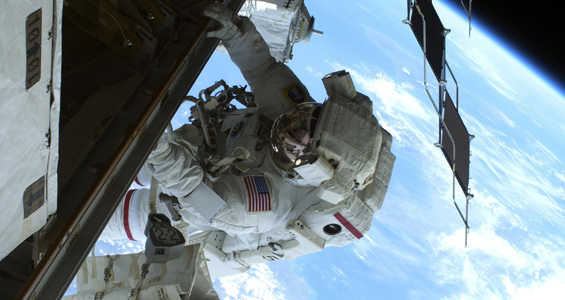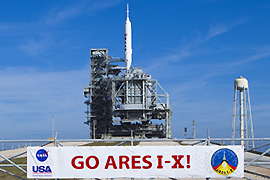The end of America’s space dreams?
Experts divided over future of US manned spaceflight after Shuttle replacement shelved.

 |
|
Could Obama’s plans spell the end of the US manned space exploration programme? [Reuters] |
Space may be the final frontier, but the question of how to best get there has divided America’s politicians and scientists as they debate controversial plans to abandon the country’s manned space-flight programme.
The White House has said it wants to cancel a Nasa programme tasked with creating the next generation of manned spacecraft, including a proposed replacement for the soon to be retired Space Shuttle.
Keep reading
list of 4 itemsTurtles swimming to extinction in Malaysia as male hatchlings feel heat
Could shipping containers be the answer to Ghana’s housing crisis?
Thousands protest against over-tourism in Spain’s Canary Islands
The Constellation programme was slated to cost more than $97bn over the next decade, but with the US national deficit spiralling skyward, plans of returning humans to the moon and even going on to Mars have been brought firmly down to earth.
Constellation was “over budget, behind schedule, and lacking in innovation”, and would be cancelled in 2011, the president’s annual budget plan said in February.
Instead, US astronauts will be blasted into space on Russian spacecraft and the money saved will be used for a slew of new research projects in coming years.
The proposed cancellation of the program has divided opinion amongst space experts, some of whom fear the end of US primacy in human space exploration.
Widespread concerns
“It could leave our country with no human exploration programme, no human-rated spacecraft and little ability to inspire the youth of America,” says Gabrielle Giffords, a Democratic congressman who chairs a subcommittee on Space and Aeronautics in Washington.
 |
| White House plans will scrap Ares, the Shuttle’s proposed replacement [GALLO/GETTY] |
He is not alone in his concerns. A survey of space industry professionals carried out last week found that 60 per cent oppose ending the programme, with many citing concerns that cancelling Constellation will mark the end of US manned space missions for good.
But are they right? Others point out that the retirement of the Space Shuttle later this year was always going to mean a temporary pause in American spacecraft carrying astronauts into orbit, and say that plans to put Americans on board Russian spaceflights have been in place for some time.
Marco Carceres, a space industry expert at the Teal Group, a team of aeronautical analysts, says that the end of the Constellation programme could cement the future of American space exploration by tapping into a previously unexploited resource; the private sector.
“There are many people who feel that the US is going to cede its leadership in manned space flight to countries like Russia, China and possibly India,” he says.
“In fact, the opposite may be the case.”
The new space plan earmarks $1.2bn for “transformative research” involving NASA and private industry, and it is here that some experts believe huge rewards could lie.
Supply missions
Abandoning the Constellation programme could produce the right market conditions for the emergence of first privately-developed space vehicles used by astronauts, Carceres says, and believes they could appear sooner than many expect.
“Realistically we are three to five years away,” he says.
|
“The possibility for money making ventures that will spin off into other industries is high” Marco Carceres, Teal Group space analyst |
Harnessing the resources of the private sector to develop space technology is not a new idea. Private space technology companies are slated to start running unmanned supply missions to the International Space Station within the next year and many market analysts see it as a matter of time before they start carrying astronauts.
If the supply flights are successful, and investors come up with development cash to add to Nasa’s research grants, the next generation of astronauts taking off from American soil could be strapped into spacecraft designed by private companies, not government agencies.
“Much depends on their [private companies’] success supplying the space station, and in attracting private investment,” Carceres says.
“The possibility for money making ventures that will spin off into other industries is high.”
Even if privatised human spaceflight does not catch on immediately, the White House insists that it has no intention of abandoning human spaceflight for ever.
The Obama adminstration’s plan outlines a “steady stream” of robotic missions “to scout locations and demonstrate technologies to increase the safety and capability of future human missions.”
The US president faces a battle to get his plans approved by a cautious Congress.
If he succeeds and his gamble on attracting private investment pays off, then the world might be about to enter a new era in which profit, rather than political prestige, drives the development of human space-flight.